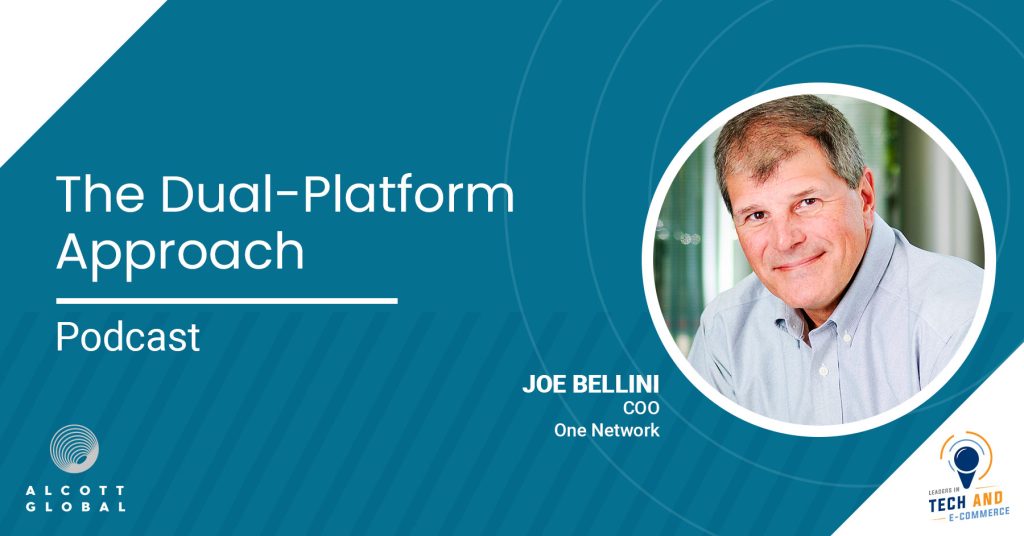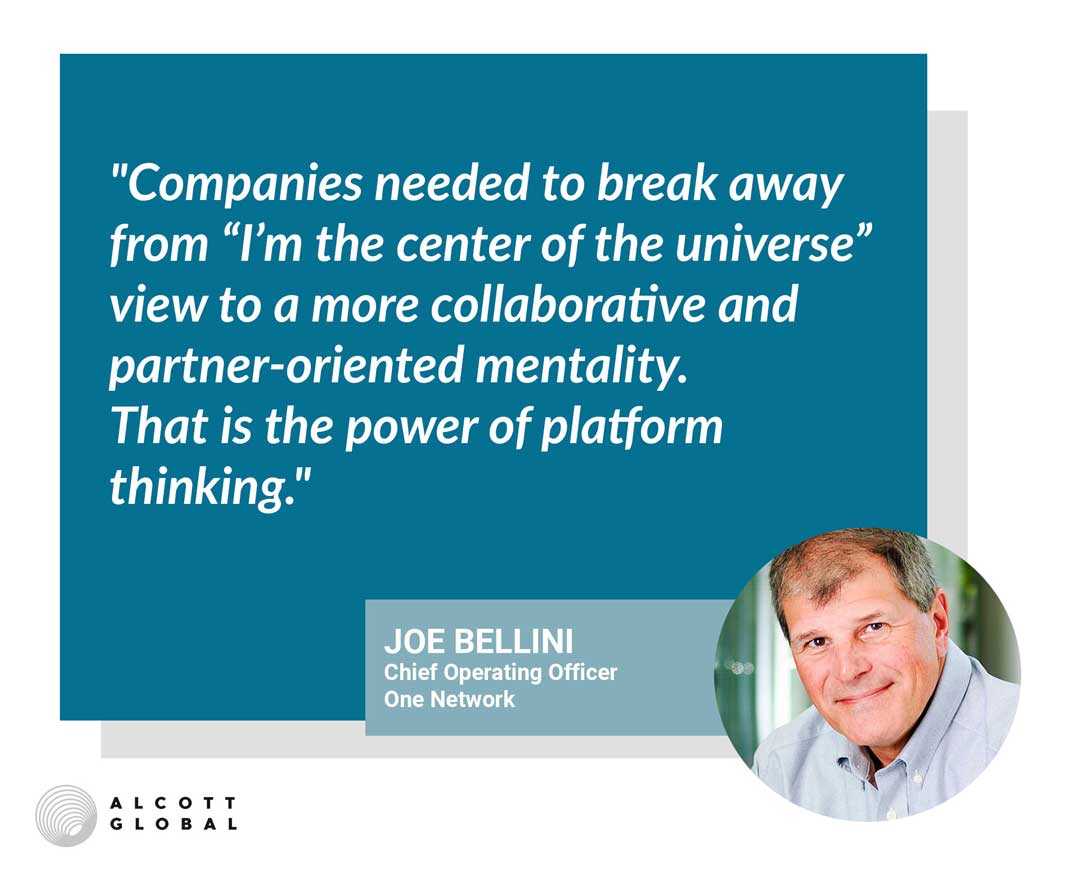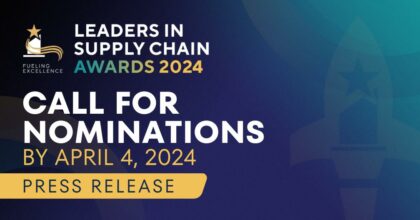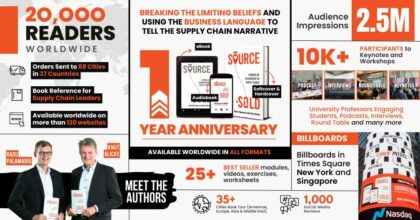Joe Bellini is Chief Operating Officer at One Network where he provides leadership across the various departments which focus on delivering network-based value across multiple industry segments and geographies. Joe brings his business solution and technology expertise gained through his work experiences at some of today’s leading technology companies, including General Electric, HP/EDS, Brooks Automation, IRI, R1/Accretive Health, and Oracle. Joe holds a patent in Supply Chain Planning and is the co-author of the business strategy book, “The Real-Time Enterprise.” Joe holds degrees in Mechanical Engineering, Applied Mathematics and Statistics is an alumnus of Harvard Business School, and is certified in Artificial Intelligence and Machine Learning from MIT Sloan.
One Network is an intelligent business platform for autonomous supply chain management. We bring together over 90,000 organizations and facilitate over 5.6 million transactions every day. Powered by NEO, One Network’s machine learning and intelligent agent technology, this multi-party digital platform delivers rapid results at a fraction of the cost of legacy solutions. The platform includes modular, adaptable industry solutions for multi-party business that help companies lower costs, improve service levels, and run more efficiently, with less waste. One Network offers a PaaS solution and developer tools that allow organizations to design, build, and run multi-party applications. One Network is helping to transform industries like Retail, Food Service, Consumer Goods, Automotive, Healthcare, Public Sector, Defense, and Logistics. Headquartered in Dallas, One Network employs 400+ people worldwide and has offices in Japan, Europe, and India.
Listen to the full discussion here:
- Listen on Stitcher
Connect with the Guest:
Joe Bellini: LinkedIn
Some of the highlights from the podcast:
- [02:33] How Joe started one of the early internet companies
- [11:27] The importance of a Dual-Network System? From enterprise focus to multiparty focus networks.
- [15:34] Developing an AI-based simulator for supply networks with the University of North Texas.
- [21:17] Overcoming Integration challenges – a tuneable system of control with 100+ APIs.
- [29:11] AI and Machine Learning in times of crisis – determining how resilient your network is based on different disaster scenarios
- [38:35] What does the future look like? Network density, a dual-platform system with the best algorithms.
- [41:51] How the CEO and the leadership team is empowering a culture of innovation.
Show notes:
- [01:52] Tell us a bit of the main milestones of your career and what is the most exciting part of being the COO at One Network.
- [02:33] I went back to work with one of the professors I knew at MIT to start one of the early internet companies.
- [04:08] A lot of companies don’t even manufacture anymore and they rely on their trading partners both upstream and downstream to execute their business and so they need a network approach to run their business and that’s what’s pretty exciting about what we’re doing.
- [05:14] I had always been intrigued by realtime systems and when I had the opportunity to apply that thinking in what was happening around supply chains and supply networks, I decided to write a book.
- [07:19] There might be different trends that you see and map out and as a mathematician, I’m sure you have different models to identify them by but what are the main supply chain trends that stand out to you?
- [09:08] Companies really needed to break away from “I’m the center of the universe” view to one where it’s more collaborative and more trading partner-oriented in nature.
- [11:23] How would you describe to somebody who doesn’t know about One Network, what makes it different?
- [12:52] There will always be problems, so you need to work as a team to resolve it and get the best result. Our platform was designed as a multi-party from inception and that’s what you need for those many to many architectures.
- [15:13] Is there a specific example that could take the discussion even further and give us a better understanding of how they saw improvements in their operations?
- [15:34] The University of Texas worked with us to develop a simulator for supply networks so we can help companies understand what the inventory levels could be within their networks while also increasing customer service levels.
- [18:48] We run the healthcare network across Africa for vaccine distribution. We’re now bringing that to the United States with a partnership with Diizzion, they represent almost more than half the hospitals in the United States and their procurement.
- [20:00] Can you give us some examples of what are the biggest implementation challenges and how are these related to the client’s expectations?
- [23:20] Any implementation technology has its challenges, but there’s really nothing to fear in layering a dual-platform network architecture because you can go as fast as you’re comfortable.
- [24:49] People love us because all of a sudden they see a multilayer, deep architecture that can configure to the way they want to run the business.
- [26:20] I was wondering what is a healthy expectation for potential clients or even practitioners when it comes to machine learning and what AI can really do?
- [29:11] You need to have a technology environment that’s designed around predictive analytics and especially prescription, otherwise, you’re really not making good use of machine learning.
- [32:33] How would machine-learning, artificial intelligence, or different type of algorithms work to help practitioners when a crisis occurs?
- [34:34] So it’s going to be up to the network operators that are planning these networks to determine what level of risk they want to take from a resiliency perspective and work with machine learning algorithms to understand variables that are trending in different directions.
- [35:33] I wanted to ask about the future and what are the projects that excite you the most as you look into the future for one network, what is next for the company?
- [38:35] When you combine network density from a dual-platform perspective and then add in unique capabilities at the node in terms of just getting better and better algorithms all of a sudden you’ve got the future in your hands.
- [39:40] How do you define a good company culture and what are you most proud of when it comes to the culture of One Network?
- [41:51] Our culture is very focused on where our customers are driving us. So we’re looking at the markets, at our customers and all the technology advantages, like machine learning and IoT and we’re able to mix all that together.
- [43:37] When you interview, what is most important for you and what do you look for?
- [47:01] What is maybe one of the best pieces of advice that you could give for a successful career?
- [48:56] Always stay on top of the latest trends and when you can, continue to grab educational opportunities.
Quote from the Episode:
About the Host:
The host, Andrei Palamariu is the founder of Supplify where he and his team works on building a platform to connect the supply chain tech ecosystem. His most interesting discussions with the clients are focused on implementing the best technology, digital transformation, company growth and expansion, turnarounds, and product and business development.
Alcott Global connects and upgrades the supply chain ecosystem by finding the right talent through executive search, developing talent through learning solutions, and meeting supply chain technology needs through a comprehensive crunch base marketplace.
The supply chain executive search has been our focus since the very beginning, offering recruitment services for top-tier supply chain roles at every level of the end-to-end supply chain: plan, source / procure, make, and deliver. Our consultants have years of experience in placing top talent, in North America, LATAM, Europe, the Middle East & Africa, and APAC, and besides speed, one of our biggest strengths is our network within the supply chain industry, and we capitalize on it to find the best solutions.
Through the years, we have grown as an organization and our offerings with it. One of our initiatives, the learning solutions- training and supply chain academy, is focused on transforming leadership- self-leadership, executive presence, influence capital, and business acumen. Through Supplify, we aim to match corporations with the top technology companies to solve their supply chain and logistics challenges with a focus on innovation and digital transformation.
We are in constant touch with the leaders in supply chain, inviting them to inspire the supply chain professionals in thought-provoking podcast episodes and events, and showcasing what is possible at the yearly Leaders in Supply Chain Awards.
Related Episodes:
The Power of a Global Network with Stephan Sieber CEO of Transporeon
Integrating D2C in Asia with Vaibhav Dabhade Founder & CEO of Anchanto









